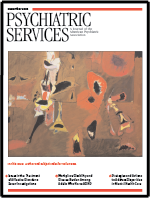Should the CATIE Study Be a Wake-up Call?
I was surprised by reports that the National Institute of Mental Health's Clinical Antipsychotic Trials of Intervention Effectiveness (CATIE) study found no substantial difference between atypical antipsychotics and perphenazine. When I read the article in the September 22, 2005, issue of the New England Journal of Medicine, I was more amazed to read how poorly all the patients had fared.
The numbers are truly stunning: Overall, 64 to 82 percent of patients in the multisite study dropped out of treatment in an average of 3.5 to 9.2 months. They benefited for an average of only one to three months. The hospitalization risk rate ranged from 11 to 20 percent over the study period. Substantial side effects were reported by 64 to 70 percent of patients, although only 30 to 36 percent told their physician about them without additional "systematic questioning." I wonder whether a placebo group would have done worse. No wonder no difference was found between the medications; everyone did very poorly.
If patients in our program did this poorly, I'd decide that our treatment was in shambles and in need of total transformation. I would ask myself five questions: How is the relationship between the doctors and the patients? How much do the patients understand and believe in the medications? Are the medications improving people's lives or just treating symptoms? Were the medications integrated into other services and supports? Were the medications used as a tool to promote the recovery of each patient? Unfortunately the researchers did not address any of these questions.
The authors conclude that "antipsychotic drugs, though effective, have substantial limitations in their effectiveness in patients with chronic schizophrenia." I would instead conclude that antipsychotic drugs, though effective, will have limited benefit for patients unless attention is paid to the doctor-patient relationship, patients' understanding of and belief in the medication, integration of other services and supports, and treatment in the context of recovery. More than anything else, this study suggests that even the best and most expensive medications have little effect as used within our present system. In short, they don't work by themselves.
I hear a great deal of talk about "evidence-based practice" and "research-informed clinical treatment." An increasingly frustrated group of effective clinicians urge "practice-based evidence" and "clinically informed research." I don't think the CATIE study should be a wake-up call to "clinicians, patients, families, and policymakers." I think it should be a wake-up call to researchers. If we are to achieve the vision of a transformed mental health system, mental health research must be transformed too.



